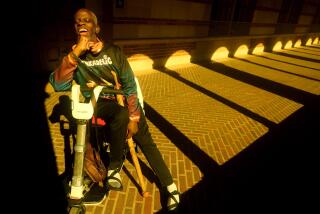Simply Human : Science: Wheelchair-bound physicist Stephen Hawking resists efforts to deify his life or his disabilities.
- Share via
Two years ago a book called “A Brief History of Time” hit the top of the best-seller lists, and an unlikely new star in a wheelchair found himself rocketing past astronomer Carl Sagan to become king of the pop science cosmos.
Since then, virtually every publication on the planet, from People to Playboy, has profiled theoretical physicist Stephen W. Hawking. Steven Spielberg is making a feature documentary about the life and work of the Cambridge University professor, and last year two Chicago bar owners started a Stephen Hawking fan club, quickly selling more than 7,500 Hawking T-shirts.
The fan club’s founders call Hawking a modern hero; others see him as more of a guru or demigod.
On Monday morning, however, Hawking rolled his battery-powered wheelchair before an occupational science conference at USC and, in a rare speech about something other than the complexities of the Big Bang or black holes, declared that his success as a scientist is the result of his refusal to be seen as anything less, or more, than simply human.
In an interview before his talk, Hawking described his aversion to being labeled some sort of disabled scientist superhero.
“I find it a bit embarrassing, in that people think I have great courage,” he said, speaking through a computerized voice synthesizer that has become a well-known part of his public persona. “But it’s not as if I had a choice and deliberately chose a difficult path. I have just done the only thing open to me in the situation.”
That “situation,” has become ingrained in modern mythology. Twenty-seven years ago, while a graduate student at Cambridge University, Hawking began experiencing the symptoms of what doctors later diagnosed as amyotrophic lateral sclerosis, or Lou Gehrig’s disease. The disease left him wheelchair-bound, and eventually cost him the use of all but a few muscles.
Still, he managed to marry and father three children. And he continued with his studies in theoretical physics, assuming the prestigious academic chair at Cambridge that 300 years ago was occupied by Isaac Newton.
It’s understandable that some people view what he does with a sort of reverence. Even hard-nosed scientists refer to the efforts of Hawking and other physicists to forge a unified “theory of everything” from the two seemingly divergent poles of modern physics as “the Holy Grail.”
It is also understandable that people see heroism in Hawking’s work and willingness to communicate his scientific insights.
In his talk, Hawking repeatedly praised the mechanical devices that allow him to make his way through a world designed for the ambulatory: The wheelchair he controls by clutching a joy stick with the barely functional fingers of his right hand, and his computerized voice synthesizer.
But most people who talk and walk without assistance see enormous endurance in Hawking’s most basic efforts. To answer a question with his synthesizer, Hawking uses the fingers on his immobile right hand to press a small clicker resting on his lap. With a first click, the small blue and gray computer screen before him scans rows of words. With a second it moves horizontally. And the third selects a word from 2,750 preprogrammed possibilities.
Slowly he builds sentences on the bottom of the screen. He then activates the synthesizer, and his response is voiced electronically from a speaker in the chair.
Asked, for instance, if he ever digresses from pure physics to ponder the meaning of human life in the cosmos--if he fears, for instance, his own death, Hawking tilts his head towards the screen and begins a painstaking process.
The team of nurses and assistants that accompany Hawking everywhere now--adjusting him in his chair, feeding him, or suctioning fluid through a hole in his neck with the casual aplomb of caddies handing a club to a golf pro--have stepped into another room. Hawking’s soft clicking mixes with the sound of a bird chirping outside a window, an elevator beeping down the hall, the air-conditioner growling.
Hawking’s eyes scan the screen. Occasionally a trickle of saliva dribbles from his chin or the tube in his throat, leaving a moist V down the front of his print shirt.
Almost five minutes after the question is asked, the electronic voice responds: “I have lived with the possibility of an early death for so long that I’m not afraid of it. But I’m in no hurry to die. There’s a lot I want to do first.”
And after another interlude: “That is why I do physics. It seems to offer the best hope of answering such questions (as the meaning of life).”
Hawking has clearly grown impatient with reporters who are more concerned with his life than his recent speculations about infinitely small cosmic “worm holes” that leak “baby universes” through the time-space continuum.
As he later told his USC audience, “I would like to be thought of as a scientist who just happens to be disabled, rather than as a disabled scientist.”
Still, in delivering his speech, he sounded more like a Nelson Mandela of the disabled than a dispassionate physicist discussing his own encounters with entropy.
Delivering a talk recorded on computer disk, Hawking said he felt lucky that he had become disabled relatively late in life, after he had made friends with able-bodied children and had played the physical games of a normal childhood.
“It is very important that disabled children should be helped to blend in with others of the same age. It determines their self-image,” he said. “How can one feel a member of the human race, if one is set apart from an early age. It is a form of apartheid.”
The important aspects of a productive existence, he said, “involve mental and organizational abilities rather than physical strength or dexterity. This is the direction in which the physically disabled should be encouraged, rather than put onto carpet-making and basket-weaving, which are inappropriate for those who are mentally active.”
“In my opinion, disabled people should concentrate on what they can do well, and should not try to compete in areas in which they will necessarily do less well than able-bodied people. They should aim to be the best period, not the best among the disabled.”
Hawking, in fact, believes that mechanical advances, including the sort of contraptions he uses, have fundamentally changed the world for the disabled, erasing many of the inequities that once kept them from achieving their goals.
He added, however, that “Aids like wheelchairs and computers can play an important role in overcoming physical deficiencies, but the right mental attitude is even more important. It is no use complaining about the public’s attitude about the disabled. It is up to disabled people to change people’s awareness in the same way that blacks and women have changed public perceptions.”
After the talk, Florence Clark, chair of the Department of Occupational Science and Occupational Therapy at USC, said that Hawking had proven himself the perfect speaker for the symposium. “He makes such a strong statement about the essence of a person,” she said--explaining that occupational science looks at people’s essences, as the distinctly human ways in which they occupy themselves, the quality that distinguishes a human from other animals.
“Especially here (in Southern California) I think a lot of people spend a lot more time developing their bodies than their essences,” she said.






